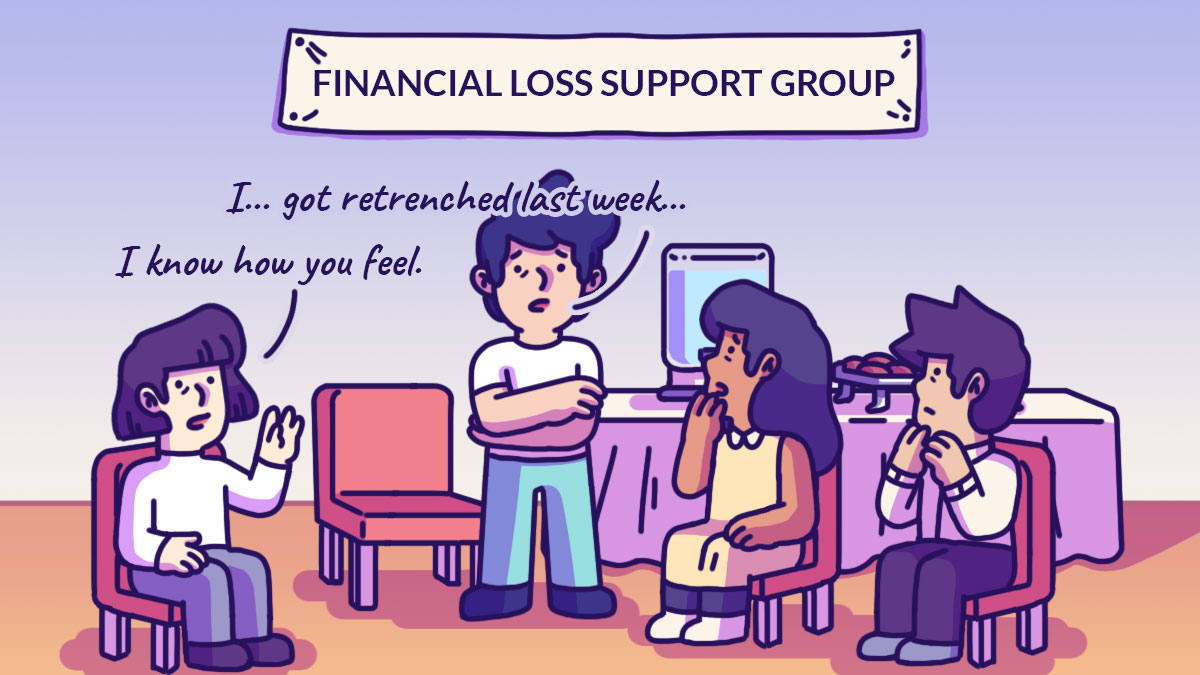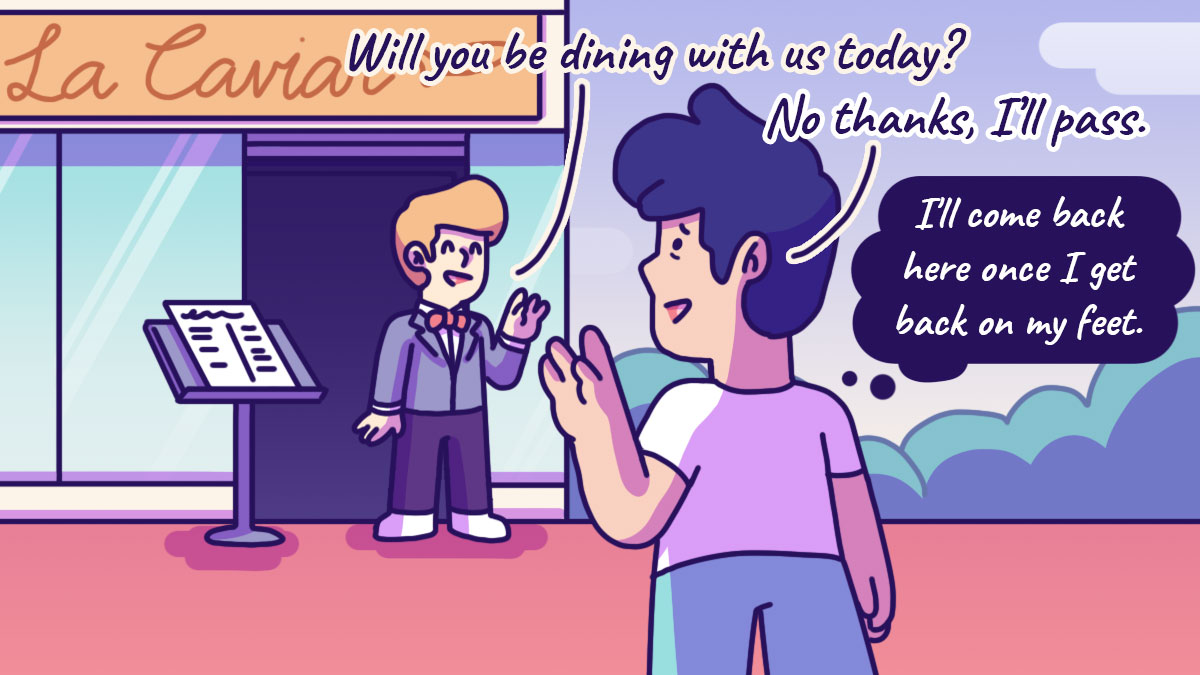Financial Planning | Personal Finance | Article
How To Cope With Financial Loss
by Andrea Chan | 29 May 2023 | 7 mins read

This article is brought to you by Singtel Bill Protect
No one likes losing money, but it’s something that can happen to anyone.
Whether it’s losing a hefty sum in a stock market crash or facing retrenchment or job loss, life is full of uncertainties and it’s important to be prepared for any curveball it throws your way.
It can be one of the most challenging and stressful experiences to endure, and no amount of woulda, coulda, shouldas can change what has already happened. In all of this, we can find one simple truth: You can’t alter the past. What is within your control, however, is how you push forward and reduce the fallout.
Here’s how you can manage if a financial loss happens to you.
Take a deep breath and reframe the situation
Experiencing financial loss can be stressful and anxiety-inducing, but it’s important to acknowledge and allow yourself to feel the grief that comes with it. Rather than immediately pushing those feelings aside, give yourself the grace to process and accept them.
Once you’ve allowed yourself time to collect your thoughts, take a step back and take stock of all the good things in your life that you do still have. In times of financial hardship, we often lose sight of our blessings and fixate on the what ifs. It can be so easy to let your emotions get ahead of you and panic sell your stocks, or worse, bury your head in the sand to avoid the situation altogether and make matters worse.
The key thing at this stage is to examine your current financial situation as objectively as you can. In this process, be mindful not to let your emotions cloud your judgement and drive you to make impulsive financial decisions.
Look at your most immediate large expenses and how you can manage those payments
The next step is to identify your most significant expenses (rent, mortgage, car payments, etc) and see if you can negotiate a payment plan directly with your creditor or reduce the amount owed.
Your debts with the highest interest rates should be your top priority to pay down, and you need to consider what you are prepared to cut loose if it’s too big a liability. Think about how your current assets are working for your benefit. Is your car loan repayment and maintenance costing you more than what value it adds to your everyday life? If it is, you might want to consider selling it and cutting your losses.
If you are out of a job and unable to find one soon, these monthly minimum payments will start to pile sky high, and it’ll be all too easy to drown in the high interest charges.
Examine your daily expenses and find ways to cut back

If you don’t already have a budget, now’s the best time to begin one.
Small daily expenses can often add up without us noticing, and it’s a good idea to review your most common transactions every now and then to see where your money is going every month.
Cutting back on luxuries like eating out and clothes shopping can help reduce overall expenditure, and even the smaller expenses like your weekly boba could be redirected to your more immediate necessities. Once your financial situation stabilises, you can always reintegrate these wants back into your life.
Look through all the subscriptions you don’t really use, like gym memberships or streaming services, and think about cancelling them for the time being as you get back on your feet again.
The bulk of our daily expenses most likely come from grocery shopping, and with food inflation to factor in, your grocery bill could snowball at an alarming rate. Buying generic store-brand products is a good alternative to name brand, often tasting just as great.
Find ways to increase your income
Side hustles and part-time work are also viable options for coping with financial loss. Are you crafty or creative? You could sell your goods or services across multiple online platforms or earn some extra cash by dropshipping.
If you have a particular area of expertise, you could take on freelance work or even offer tutoring services, or alternatively, you could also look for a part-time job. There are plenty of remote and flexible job opportunities available that can provide a good stream of income while you bounce back from your financial setback.
Prevent history from repeating itself
It’s essential that you learn from this experience and take measures to prevent the same thing from happening again. To prepare for unexpected events like losing a job or a medical emergency, it’s important to build an emergency fund that can cover three to six months of expenses.
You should also have a backup fund in case one of your work tools breaks down. If you largely work online as a freelancer, you can’t afford to have your computer out of commission, and if you’re a food delivery rider, your motorcycle is your rice bowl. Keep that bowl filled by ensuring you have enough cash on hand to maintain or fix your tools.
Beyond having an emergency fund, you should also have insurance to protect you from further financial loss from large medical bills that could crop up in the future or from job loss because you fell very ill and are unable to work.
Review your current investment strategy and make sure that you’re investing in a diversified portfolio that can withstand market fluctuations. You also might want to explore other ways to diversify your income sources so that you’re not reliant on a single stream.
A financial loss can be challenging and devastating all at once, but it’s vital to keep a level head and take proactive steps to address the situation. What’s done is done, and it’s okay to feel sorrow for what you’ve lost. However, drowning in that sorrow only increases your stress and anxiety, which impacts your ability to think clearly and take control of your finances.
Remember, financial loss can happen to anyone. It’s how you respond — clearly and strategically — that makes all the difference.
Content sponsored by Singtel Bill Protect
In partnership with Etiqa Insurance, Singtel recently launched a free telco bill protection plan that aims to help customers during uncertain times. As the first complimentary bill protection plan in Singapore, Singtel Bill Protect offers customers with insurance coverage valid for 1 year. With Singtel Bill Protect, customers can receive a waiver of their unpaid eligible Singtel bills up to S$600 (given over 6 equal monthly instalments) in the event of job retrenchment or a lump sum payout of up to S$1,200 upon accidental death.
Find out more here: singtel.com/bill-protect
Terms and conditions apply. This policy is underwritten and distributed by Etiqa Insurance Pte. Ltd. (UEN: 201331905K).
This content is for reference only and is not a contract of insurance. Full details of the policy terms and conditions can be found in the product summary. It is usually detrimental to replace an existing accident and health plan with a new one. A penalty may be imposed for early plan termination and the new plan may cost more, or have less benefits at the same cost.
This policy is protected under the Policy Owners’ Protection Scheme which is administered by the Singapore Deposit Insurance Corporation (SDIC). Coverage for your policy is automatic and no further action is required from you. For more information on the types of benefits that are covered under the scheme as well as the limits of coverage, where applicable, please contact Etiqa or visit the Life Insurance Association (LIA) or SDIC websites (www.lia.org.sg or www.sdic.org.sg).
This advertisement has not been reviewed by the Monetary Authority of Singapore. Information is correct as at 29 May 2023.














